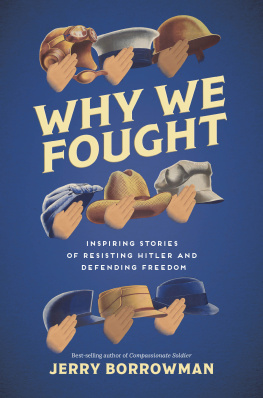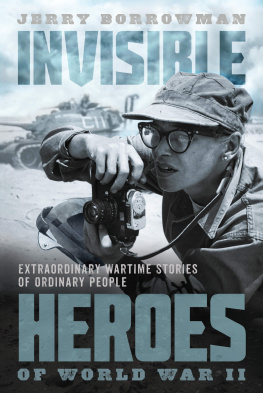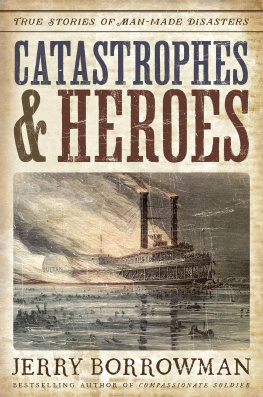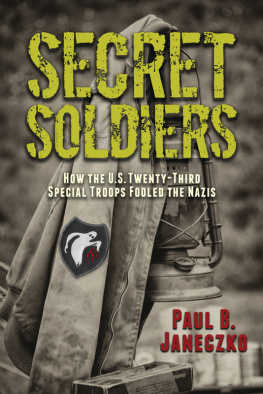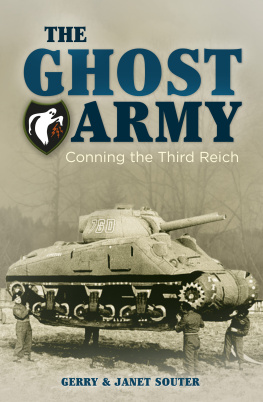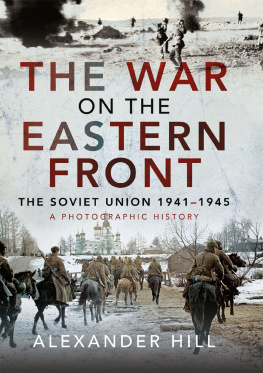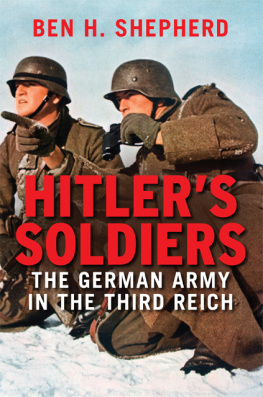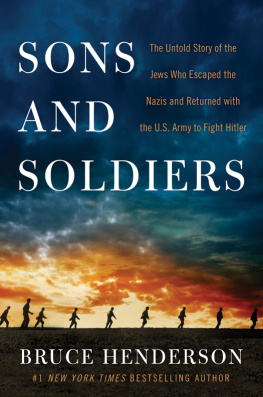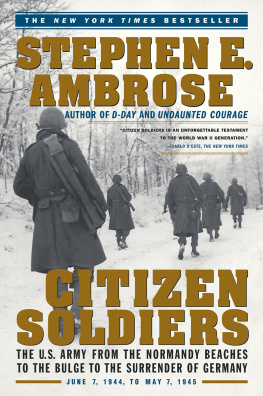Book design Shadow Mountain
Cover image: Based on the WWII poster, If the cap fits, wear it!; public domain
Art direction: Richard Erickson
Design: Sheryl Dickert Smith
Interior images: page 3, public domain; page 38, New York Daily News , courtesy Camerer; page 71, public domain; page 84, courtesy National Archives UK; page 121, Wikimedia Commons, courtesy Agnes Hirschi; page 144, Roger Viollet/Getty Images; page 169, Wikimedia Commons, courtesy Steve J. Morgan
2021 Jerrold J. Borrowman
All rights reserved. No part of this book may be reproduced in any form or by any means without permission in writing from the publisher, Shadow Mountain, at permissions@shadowmountain.com. The views expressed herein are the responsibility of the author and do not necessarily represent the position of Shadow Mountain.
Visit us at shadowmountain.com
Library of Congress Cataloging-in-Publication Data
Names: Borrowman, Jerry, author.
Title: Why we fought : inspiring stories of resisting Hitler and defending freedom / Jerry Borrowman.
Description: Salt Lake City : Shadow Mountain, [2021] | Includes bibliographical references. | Summary: Author Jerry Borrowman recounts seven lesser-known stories of World War II spies, resisters, and others who fought for freedom against the Nazi threatProvided by publisher.
Identifiers: LCCN 2021013205 | ISBN 9781629729343 (hardback) | eISBN 978-1-64933-032-1 (eBook)
Subjects: LCSH: World War, 19391945Biography. | World War, 19391945Underground movementsBiography. | BISAC: HISTORY / Military / World War II | HISTORY / Modern / 20th Century | LCGFT: Biographies.
Classification: LCC D736 .B675 2021 | DDC 940.54/86730922dc23
LC record available at https://lccn.loc.gov/2021013205
Printed in the United States of America
LSC Communications, Crawfordsville, IN
10 9 8 7 6 5 4 3 2 1
Contents
Authors Note
Recently a friend asked why I have been so interested in writing about Americas involvement in World Wars I and II. It was a fair question, given that Why We Fought is my fourteenth published book written about heroic figures who served in the two world wars. After thinking about his question for a moment, I replied to my friend that since childhood I have been fascinated and inspired by the courage of ordinary men and women who risked their lives on behalf of freedom. It is worthy to fight for your countrybut so much more meaningful to fight for an ideal, like liberty.
In the case of the seven stories featured in Why We Fought , most fought on behalf of the Allies even though not required to do sothey were volunteers in defeating Nazi Germany and the horrible repression it represented. All of them were at constant risk, yet they persisted because it was the right thing to do.
Which brings me back to my friends questionI write about these people because their stories deserve to endure, and they should be honored by as many readers as possible. Quite simply, we should never forget. Thank you for sharing in this experience.
Chapter 1
Virginia Hall
We Must Find and Destroy Her
Introduction
Report to OSS London on two days of sabotage in Nazi occupied France, August 4, 1944:
A bridge blown at Montagna; an automobile road cut and four cuts in the railroad near Langogne; a German freight train derailed in a tunnel near Brassac; a German freight train derailed in a tunnel near Bioude; a railway bridge blown near Le Puy; the Monistrol DAllier freight train derailed in a tunnel and 15 meters of track destroyed in Solignac; a railway bridge destroyed at Lavoute; a railway bridge wrecked at Chamalieres and the locomotive driven into the gulf below; 500 newly recruited French resistors organized into companies.
These activities were done under the direction of Virginia Hall in her role as leader of the Heckler Circuit, one of the largest resistance networks in France. It was a remarkable accomplishment, particularly since many of the French Maquis (freedom fighters) were not at all used to the idea of reporting to a woman. But through sheer competence and extraordinary bravery she proved herself more than equal to the challenge of directing millions of francs and hundreds of thousands of pounds of supplies, guns, and ammunition dropped by parachutes into the hands of those locals brave enough to run the risk of Nazi retribution to help free their country from German domination.
Those who reported to Virginia in 1944 knew her only as Diane, the code name assigned to her by the United States Office of Strategic Services (forerunner to the Central Intelligence Agency). But a small handful in Washington and London knew the true identity of the woman whom the Nazi Klaus Barbie, the infamous Butcher of Lyon, identified as the Enemys Most Dangerous Spy. In wanted posters distributed throughout France he added, We Must Find and Destroy Her. With a price on her head, Virginia Hall was never safe. Even more remarkable, this was her second time in France. The first time she worked as an operative for the British; the second time, she worked for the United States.
Leadership at an early age
Though it would be decades before her heroism in World War II was posthumously made known to the world, her leadership skills came as little surprise to her fellow students at the Roland Park Country School in Baltimore. After all, they elected her class president, editor-in-chief of the school newspaper, and captain of the field hockey team, recognizing her courage and charm from an early age. But Virginia displayed an unusual style of leadership; one day she wore a live snake to school as a bracelet; she hunted with a rifle, rode horses bareback, and otherwise did her best to live up to her classmates description of her as the most original among them. Virginias father was a successful Baltimore banker, her mother a socialite who relished circulating among Marylands social elite. Her mother had great plans for her daughter to marry into money and maintain the familys prominence into the next generation. But Virginia was far too restless for that. Despite attending some of the most prestigious universities in America, including Radcliff College, Barnard College, and George Washington University, she always dropped out before completing a degree. At Barnard she failed physical education simply because she didnt show up for class. But despite those failures she showed remarkable skill in languages, eventually learning to speak French, German, Spanish, Italian, and Russian in addition to her native English. Much to her later regret she always had an American accent when speaking these languages, which increased her risk of detection while fighting the Nazis.
Virginia moved to Paris in 1926 at age twenty and then to Vienna in 1927 to complete her academic studies at the Konsular Akademie, where she studied languages, economics, and journalism. After Virginia received her degree, Virginias mother hoped that her daughter would come home to Maryland and settle down, but Virginia was just getting started on her remarkable life in international affairs. Her next move was to join the US State Department with an initial assignment in Warsaw, Poland. She was assigned as a consular service clerkthat was the most that a young woman could achieve at the time. But Virginia had high hopes of one day advancing into the diplomatic corps, where she would have real influence and authority. Though it would be difficult, a narrow path was open if she could pass the required competency tests.

